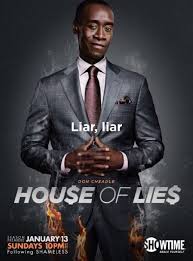 Well no, but it does make for entertaining, and in a way, thought-provoking television. Showtime’s popular dark comedy, House of Lies, is described as a “subversive, scathing look at a self-loathing management consultant from a top-tier firm.”
Well no, but it does make for entertaining, and in a way, thought-provoking television. Showtime’s popular dark comedy, House of Lies, is described as a “subversive, scathing look at a self-loathing management consultant from a top-tier firm.”
Marty Kaan (as portrayed by Don Cheadle) and his MBA colleagues at Kaan & Associates charm unsuspecting corporate fat cats into closing deals while spending a fortune for their services. The fat cats actually think they’ve won but they’ve lost, so it’s an interesting take on “I win-you-lose.” Marty is never above using any means (or anyone) necessary to get his clients the information they want.
“I believe in the dharma of search and destroy…I believe in the dharma of kicking ass,” he says. That’s a decidedly unique approach to the concept of dharma; which in Indian religions has multiple meanings but generally means the “ultimate law of all things.”
In certain contexts, dharma designates human behaviors considered necessary for the order of things in the universe, principles that prevent chaos, behaviors and actions necessary to all life in nature, society, family as well as at the individual level.
Marty deconstructs dharma to mean something very different in order to fit his muscular business model. In one episode he says, “Bad is good; good is bad. Chaos, entropy kaching! – keep going.”
The show is based on the book, House of Lies: How Management Consultants Steal Your Watch and Then Tell You the Time, written by Martin Kihn, a former consultant at Booz Allen Hamilton.
So yes House of Lies is entertaining, but in a somewhat scary way, because it might just cut a little too close to the bone: there may be some business people that are rooting for Marty’s “house of lies” to succeed. Maybe they are even looking to emulate his methods.
This is a world where collaboration, trust and shared value are either non-existent or turned on their head to gain an advantage – viewer discretion advised.
Image: House of Lies via Showtime